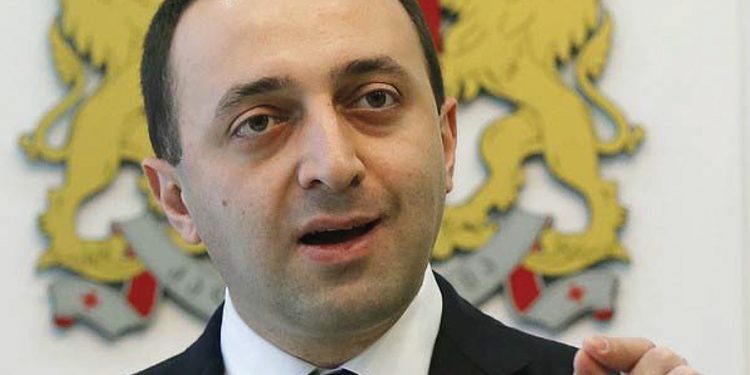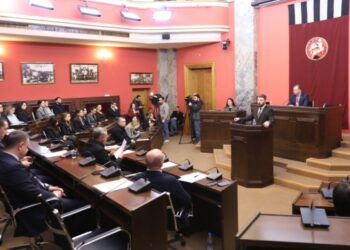The decision involving a visa ban is discretionary, which means that the person who is denied a visa does not have the right to evidence. – David Kramer, former senior US State Department official and Executive Director of the George W. Bush Institute.
Following this week’s announcement by the United States Department of State that four of the nation’s top judges would be barred from entry into the United States, the ruling party “Georgian Dream” has dug in and defended the judiciary. Despite repeated claims that the quartet were steeped in rampant corruption, Georgian Prime Minister Irakli Garibashvili and his GD colleagues have not only stood by their sanctioned friends, but also announced that the government stands by them too.
The United States has yet to formally respond to the counter accusations of the ruling party. Multiple members of “Georgian Dream” have demanded Washington provide evidence for its accusations of corruption. Others more hilariously have suggested that, in fact, it is the US that is corrupt by tapping their communications, while simultaneously admitting that they made these deals that, in all likelihood, were leaked by deputies and whistleblowers that have yet to come out.
Most notably, Former Prime Minister and leader of the party “For Georgia” Giorgi Gakharia posted to social media succinctly, saying “we’re witnessing a dangerous blurring of the line between the Party & Judiciary.” However, the most interesting part of this may lie on the surface. Why would the United States, with an innumerable number of other interests that are likely far more pressing than four aged and obese jurists, bother filing sanctions and making such a publicly viral announcement?
The threat is to far more than the judges themselves. While the fight against corruption is ongoing and still important, the sanctions mark a significant warning to the ruling party and the national leadership. Like a shot across the bow of a ship to warn of impending transgressions, the United States, arguably one of Georgia’s greatest political and economic backers, has likewise warned its friend not to cross into dangerous waters.
“As the head of government and the ruling party’s leader, I fully back all judges,” Garbashvili stated after a closed door meeting with the Supreme Council of Justice. “I have also informed the honorable judges that we will be fully supportive. We shall do everything possible to defend the court’s independence from interference or pressure.” Naturally, unwilling to let those that are already linked to his party’s leadership, the Prime Minister will not let his corrupt friends down.
Additionally, more Georgian Dream blunders continue to “prove too much” as the old lawyers’ saying goes. Chairman of the Georgian Dream party Irakli Kobakhidze, famous for his inability to properly groom himself, willingly or unwillingly shared that he too was a target of corruption. “I won’t specify the content yet, who it was and what they asked for, to keep it in our arsenal, but actually, I can repeat that there were phone conversations with me and they asked for something that surprised me,” he said.
“They demanded from me a very gross violation of the constitution, legislation, etc. They demanded it for political interests.” According to him, this unnamed, mysterious figure asked him to commit an act in “direct, blatant violation of the constitution, it was about the judicial system.” Of course, if someone were to call Kobakhidze with such demands, it would only be because he was known to commit such acts on demand, and was reliable in his readiness to do so.
Kobakhidze also made statements that mirrored the sentiments of his party that the United States is targeting Georgia’s independent court system. This comes despite the missions, and billions of dollars the US and its European partners have invested over decades to establish such an independent judicial system to begin with. Kobakhidze called the sanctions an attack on the country that was made from an “emotional background.”
The US, while certainly the target of low-hanging fruit arguments about imperialism, would not make half-baked remarks and issue administratively laborious sanctions packages against these judges and their families unnecessarily. The US’s title for being a notorious spend-thrift when it comes to foreign programs may or may not be well deserved, but when it comes to intelligence and foreign diplomacy, these proverbial warning shots are not taken lightly. For Georgian Dream officials to try and sheepishly laugh off the matter is more telling than the sanctions themselves.
However, rather than try and avoid a tidal wave, Kobakhidze stresses the importance of capsizing the boat ahead of time. “This cannot be appealed in Georgia. It could theoretically be appealed in America, I don’t know how appealable this particular act is, it’s up to the local jurisdiction,” he states. To him, taking the legal battle to the United States is the better place to fight his battles, not focusing on internal or regional issues.
Despite this political squabbling, the signal from the United States, the European Union, and all of Georgia’s pro-Western allies is clear: fix yourself or be forgotten. The collective West must prevent Georgia from sliding back into the maw of the Kremlin, come hell or proverbially high waters. US and EU leaders must convene to ensure Georgia and its overwhelmingly pro-Western citizenry are not held hostage.
It is clear that as long as political puppet master Bizina Ivanishvili and Georgian Dream continue their rule, the idea of becoming an EU candidate, much less a member, is impossible. But the West should not act brashly. Surgically-targeted financial sanctions and restrictions by both the US and EU aimed at the assets of Ivanishvili and his party’s elite are needed to truly put pressure on the government without inadvertently hurting the nation. If Europe, the US, and the free world are serious about tackling the oppressors in the world, these steps must be taken to save Georgia.
By Michael Godwin














